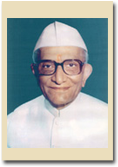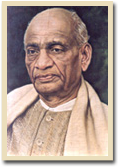We should be ashamed of resting, or having a square meal, so long as there is one able-bodied man or woman without work or food.

M. K. Gandhi
Young India, February 5, 1925, p. 48
We should be ashamed of resting, or having a square meal, so long as there is one able-bodied man or woman without work or food.

M. K. Gandhi
Young India, February 5, 1925, p. 48
We, Mohandas Karamchand Gandhi age about years 60, Hindu, profession weaving and farming, residing at Satyagrahashrama, Vadaj, Taluka Uttar Daskroi, District Ahmedabad and Mohanlal Maganlal Bhatta, age about years 31, Hindu, residing at Bhoivadani Pole, Kalupur, Ahmedabad, declare by this Deed:
That in the year 1919 with the object of serving the people we, Mohandas Karamchand Gandhi and some of our colleagues together started a printing press named 'Navajivan Mudranalaya' in the city of Ahmedabad and with its help began to print, circulate and conduct as an institution for the service of the public two weeklies, the Navajivan and the Young India, both of which we had begun to conduct some time before after securing them by buying from their previous owners and managers with their total rights of ownership and possession.
The Weekly Hindi Navajivan and a department for publishing books under the name 'Navajivan Prakashan Mandir' and other more activities were carried on afterwards by us through the same institution. The said weeklies, printing press, and the department for publishing books have continued as a public institution for the education of the people under one comprehensive name of the 'Navajivan Institution'. When the said Navajivan Institution was started under the name of the Navajivan Mudranalaya its property was worth about ten thousand, in figures, 10,000 rupees. Together with the said printing press and the increase earned through the weeklies the property that belongs to the Institution today without any burden on it is worth about rupees one lakh.
The aims and objects of the said Navajivan Institution which have been referred to in the previous para 2 are as under:
OBJECTS: To propagate peaceful means for the attainment of Hind Swaraj i.e. Swaraj for India by educating the people through cultivated and enlightened workers devoted to the Gujarati language who desire to identify themselves with the life of Gujarat through the means of Gujarati and to serve India in this pure manner.
For the fulfilment of this object to conduct the Navajivan, through it to carry on propaganda for peaceful attainment of Swaraj; and particularly
It is to be noted that Navajivan Trust was to propagate by publication of journals and books the activities Gandhiji had started for the religious, social, economic and political advancement of the people. It was to carry on all the activities on the basis of self-reliance. For the purpose of self-reliance, the press might undertake printing of such writings which are not contrary to the objectives of the Trust. It is to the credit of the devoted trustees of the Navajivan Trust that they have strictly observed the objectives of the Trust even at the cost of profitable printing work going past them. Similarly no advertisement is taken in weeklies, papers or books published by the Trust. The objective of self-reliance has also been observed strictly as, so far, no grant or donation has been accepted by the Trust.
On the 12th March 1930 Gandhiji started his famous Dandi March for protesting against the Salt Act. Satyagraha movement acquired great momentum and the Viceroy promulgated very strict press ordinance. As the Navajivan Trust did not pay the required security deposit of Rs. 5,000/- the Government seized the press and shifted the printing machines to Mumbai. Nevertheless, devoted workers continued the publication of Navajivan and Young India for eight months from unknown place. About ten thousand copies from the underground press were taken out on Roneo machine and distributed in time.
After Gandhi-Erwin pact, publication of these weeklies was resumed. The Government returned the printing machines seized earlier but in a dismantled condition. During this period the office of Navajivan Trust was shifted to a building near Bala Hunuman on Gandhi Road. Printing press was also shifted to a building situated behind the office.
After Gandhi-Erwin pact, publication of these weeklies was resumed. The Government returned the printing machines seized earlier but in a dismantled condition. During this period the office of Navajivan Trust was shifted to a building near Bala Hunuman on Gandhi Road. Printing press was also shifted to a building situated behind the office.
The year 1932 was a very crucial year for Navajivan Trust. Most of the workers had either left the institution to work in their villages or gone to jail. The press was seized and released after some time. To allow the press to remain idle would mean allowing it to rust. It was, therefore, sold. Office was also closed. Only Mumbai office was kept open
On February 20, 1940 Gandhiji made a will in favour of Navajivan Trust as under :
ANY WILLS that I may have made before this day stand cancelled and this be deemed as my last Will.
I do not believe that I have any property. Nevertheless, anything which by social convention or in law is considered mine: anything movable or immovable; books, articles etc. that I have written and may write hereafter, whether printed or not printed and all their copyright; I endow as my heirs the Navajivan Institution, whom I hereby declare as my heirs, and the Declaration of Trust for the establishment of which I along with Mohanlal Maganlal Bhatta got registered as a deed of trust on 26-11-1929 and of which Shri Vallabhbhai Jhaverbhai Patel, Shri Mahadev Haribhai Desai and Shri Narhari Dwarkadas Parikh are at present Trustees.
The Navajivan Trust will give to the Harijan Sevak Sangh for Harijan service, every year, after my demise, twenty-five per cent of the net profit that it carns out of the sale of the books mentioned above and out of the exercise of their copyright.
In order to execute my desire as expressed by this my Will and to make the necessary arrangements for it I appoint Bhai Mahadev Haribhai Desai and Narhari Dwarkadas Parikh as my executors. In the absence of any one of them by death or any other cause the other has the right to make the necessary arrangements and to execute this my Will.


Sd. MOHANDAS KARAMCHAND GANDHI MALIKANDA, 20-2-1940
Witnesses : Sd. PYARELAL NAYYAR 20-2-1940
Sd. KISHORLAL G. MASHRUWALA 20-2-1940
After independence the main work of the Trust has been to spread the thoughts of Gandhiji through publication of books. To this end in view subjectwise writings of Gandhiji, memoirs of his co-workers, diaries and publications depicting various facets of Gandhiji's personality have been brought out. These publications are mainly in Gujarati, Hind and English.
Right from the very beginning there has been a tradition of Navajivan to provide publications at an affordable price to the reader. Publications which are considered essential for propagation of Gandhiji's message and his thought processes are offered at the subsidised price.
In the recent years to mark 125th birth anniversary of Gandhiji the Trust launched a project of publishing Gandhiji's autobiography in all major regional languages of India at a subsidised price.
Regional languages version of autobiography of about 452 or more pagess is offered at Rupees 20 per copy. Originally written in Gujarati, the Autobiography has been translated into Assamiya, Bengali, English, Hindi, Oriya, Tamil, Telugu, Malayalam, Kannada and Urdu.
The Trust has also undertaken to translate and publish in Gujarati all the volumes of 'Collected Works of Mahatma Gandhi'. It has published 82 volumes in Gujarati so far.
During Gandhi Centenary Year Navajivan has published 'Selected Works of Mahatma Gandhi and offered it to readers at subsidised price. The set was reprinted in Gandhi's 125th birth anniversary year. To meet the demand of regional languages Navajivan has embarked upon another ambitious project to publish 'Selected Works of Mahatma Gandhi' in regional languages. It has already published these books in Malayalam, Telugu and Bengali. Tamil and Kannadas editions are in press and will be released during 2001.
People living under the constant threat of the third World War are attracted to the thoughts and teachings of Gandhiji, as an alternative to the war, to resolve their internal as well as external conflicts.
Moreover on account of fast changing world, people are torn amidst various ideologies, face challenges every day which threaten to uproot them from moral grounds leading to tension, anxieties, stress and depression. Gandhiji's message of peace, love and universal brotherhood has greater relevance now. His speeches and writings are living source of solace and inspiration to millions of people through out the world and the Navajivan Trust with its team of dedicated workers is providing excellent ethical literature to the readers, thereby rendering a great service to the humanity at large.